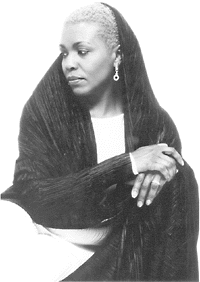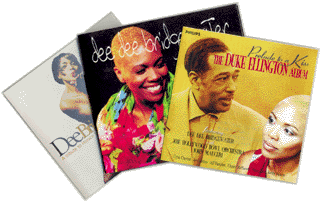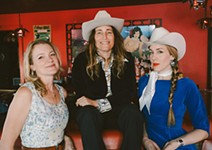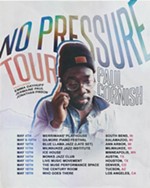Oh, Lady, You're Good!
Dee Dee Bridgewater
By Raoul Hernandez, Fri., April 17, 1998
 In 1997, the inaugural year of Sarah McLachlan's Lilith Festival, women ruled the rock & roll roost. Shawn, Eryka, even Abra landed headlines, hits, and Grammys (or nominations), transforming themselves into an emerging female hierarchy of a new generation. At the same time, somewhat outside the media spotlight in the shadows of Lilith's second stage, stood one of the premier divas of modern jazz, Cassandra Wilson - Wilson and the spirit of two other jazz divas not involved with the festival; two Satin Dolls whose long, illustrious careers as vocalists virtually define the word "diva" while at the same time embodying everything associated with a figure as romanticized as the female jazz singer. These two ladies' names? Dee Dee Bridgewater and Ella Fitzgerald. Dee Dee and Ella. Fitzgerald, who died in 1996, was the third and final member of jazz's eternal triumvirate: Fitzgerald, Billie Holiday, and Sarah Vaughan. Celebrated for accomplishments that helped shape modern culture, Fitzgerald's contribution to the jazz idiom is immeasurable; not the least of her contributions was her vocal ability, an uptown, perfectly-ennunciated, swinging, scatting sheen that stands as a monument to the human voice. Dee Dee Bridgewater, whose singing style has been compared to that of Vaughan and Carmen McCrae, may not yet claim the rights to such hyperbole, but if 1997 was indeed the year of the woman, then it was also the year that the 47-year-old Bridgewater stepped forward to claim her rightful place next to Cassandra Wilson as one of the two leading candidates in the new pantheon of Holiday/Vaughan/Fitzgerald. And she did it with Dear Ella.
In 1997, the inaugural year of Sarah McLachlan's Lilith Festival, women ruled the rock & roll roost. Shawn, Eryka, even Abra landed headlines, hits, and Grammys (or nominations), transforming themselves into an emerging female hierarchy of a new generation. At the same time, somewhat outside the media spotlight in the shadows of Lilith's second stage, stood one of the premier divas of modern jazz, Cassandra Wilson - Wilson and the spirit of two other jazz divas not involved with the festival; two Satin Dolls whose long, illustrious careers as vocalists virtually define the word "diva" while at the same time embodying everything associated with a figure as romanticized as the female jazz singer. These two ladies' names? Dee Dee Bridgewater and Ella Fitzgerald. Dee Dee and Ella. Fitzgerald, who died in 1996, was the third and final member of jazz's eternal triumvirate: Fitzgerald, Billie Holiday, and Sarah Vaughan. Celebrated for accomplishments that helped shape modern culture, Fitzgerald's contribution to the jazz idiom is immeasurable; not the least of her contributions was her vocal ability, an uptown, perfectly-ennunciated, swinging, scatting sheen that stands as a monument to the human voice. Dee Dee Bridgewater, whose singing style has been compared to that of Vaughan and Carmen McCrae, may not yet claim the rights to such hyperbole, but if 1997 was indeed the year of the woman, then it was also the year that the 47-year-old Bridgewater stepped forward to claim her rightful place next to Cassandra Wilson as one of the two leading candidates in the new pantheon of Holiday/Vaughan/Fitzgerald. And she did it with Dear Ella.
A tribute to Ella Fitzgerald featuring 13 tunes well-associated with the legendary vocalist ("A-Tisket, A Tasket," "Let's Do It [Let's Fall in Love]," and "Cotton Tail"), as well as jazz legends such as Ray Brown, Kenny Burrell, Milt Jackson, and Slide Hampton, 1997's Dear Ella album not only broke Dee Dee Bridgewater to a wider audience, it won her two Grammys. In fact, while the singer acknowledges that her fourth release on Verve has only sold 200,000 copies thus far (50k more than her usual), she admits that demand for her to "do Ella" is high, and it will keep her on the road the better part of three years. If anything, it seems clear that, like Titanic before the Oscars, Dear Ella has not yet peaked in terms of sales. And what better development for the supremely talented Bridgewater, who has devoted most of her life to singing?
Born Denise Garrett in Memphis, Tennessee, Bridgewater grew up in Flint, Michigan in a household headed by a trumpet player who taught jazz greats such as Booker Little. In 1969, at the age of 19, the already jazz-savvy singer toured the U.S.S.R. with a big band from the University of Illinois, apparently catching a healthy dose of wanderlust as well. The following year, 1970, she married trumpet player Cecil Bridgewater and moved with him to New York so he could play with Horace Silver. By mid-decade, Dee Dee was divorced and on Broadway, where her role in The Wiz landed her a Tony Award in 1975. Afterwards, she moved to Los Angeles, cutting a couple of pop albums, Dee Dee Bridgewater for Atlantic in 1976, and Just Family for Elektra the following year. Soon after, not content to be pigeonholed, she began touring the world with a series of musical productions such as Carmen, Cabaret, Sophisticated Ladies, and Lady Day, the last of which landed her in Paris, where she decided to stay.
Twelve years later, still a Parisian, Bridgewater calls from a hotel in Italy, sighing wearily, "I live on the road - I live out of a suitcase." Excited about her first visit to Austin, however - an event not likely to be repeated this side of the millennium, especially considering Bridgewater's quickly mushrooming superstardom - the singer is upbeat, laughs often, and is cooing by the end of the conversation when I mention that Willie Nelson is from Austin. "Willie Nelson lives there? I love Willie Nelson." (Giggles)
Austin Chronicle: So, how does a woman who grew up in Flint, Michigan end up in Paris?
Dee Dee Bridgewater: (Laughs) Cute. Umm, how does a woman from Flint, Michigan end up in Paris? Well, I'd come to Paris in 1984 with an international touring company of Sophisticated Ladies, and since I was the star of the show and that was a very big success for me, I decided to stay for a few months. Then I was offered a one-woman show about Billie Holiday in '86 called Lady Day, so I came back in January '86, and that time I came with my daughters [8 and 14], and when the show ended in October '86, my daughters decided they wanted to stay, so we stayed. Soon after that show ended, I met the man who is now my husband, and now I have a son to add to my two daughters.
AC: Paris has a reputation for being very nurturing to artists.
DDB: It's very nurturing. That's why so many artists end up coming over here. Even if they don't stay, they come to be inspired so they can write, so they can dance, so they can paint...

AC: Has it inspired you?
DDB: Yeah, it's been a very nurturing place for me. Living in France was actually a good decision I made. I've been able to do just about everything I ever dreamed of doing in the States, but was always told, "No." (Laughs). In the States, if you're a recording artist, then you have to stay in a certain genre - whatever the record company decides is your bag, your sticker. Here, even though it's known that I am a "jazz singer," I have put out pop albums, I've recorded with rock people, I've recorded with traditional French singers, I've done musical theatre, I've had my own TV show, my own radio show, I've done some light opera. I've done all kinds of stuff.
AC: Ever met Catherine Deneuve?
DDB: Yeah, I met Catherine Deneuve. Very cool, very, very cool. There was no love lost. (Laughs)
AC: In some of your press clippings, you've been outspoken about Europe being more nurturing to jazz musicians than the States.
DDB: Well, you know, it's the obvious question that I'm asked since I live in France. Anytime I do interviews with Stateside journalists, that's what they want to know. Most journalists feel I had to come over here because I couldn't work over there, which is not at all the case. My decision to stay in France was a personal one that had nothing to do with my career. I had a nice career in the States, and in fact, I think the reason that my career seems to have taken off now that I'm working again in the States, is because I had a good career when I left; I left on good terms with everybody. For traditional jazz, though, France is a wonderful country to live in. They love traditional jazz there. For the French that is the real jazz. They're not at all into smooth jazz and contemporary jazz. They don't like it. They don't feel it's real. They feel it's a bastardization or a watered-down thing. It's a cop-out.
AC: How do you feel about smooth jazz?
DDB: I don't like it either. (Laughs) I mean, it's very antiseptic to me. It's kinda like Muzak. I don't know. It's just a drag that that's what we call jazz today. Young people growing up think of Kenny G or David Sanborn; for them, that's what jazz is. It's unfortunate.
AC: A well-respected local jazz singer, Pam Hart, has said she put smooth jazz on her debut in order to get any exposure at all.
DDB: I can understand that. I can totally understand that. It's very difficult for a young artist starting out, one who doesn't have any weight behind them to dictate what they want to do to a record company. That's impossible. A record company is going to want that artist to do the thing they think is going to sell the easiest or break an artist into the marketplace the easiest. If you want radio airplay, you're sure not going to get it with traditional jazz. You're gonna get it with your smooth jazz. And you'll be more like an Anita Baker, who really isn't a jazz singer. I can't criticize anybody for doing what they need to do to just get their foot in the door, you know? It's just very, very difficult. The reason I stay on the road is because I can't live off of my album sales, although I sell well for a traditional jazz artist; my albums usually do between 100,000-150,000. And with this Dear Ella, maybe I'll do 200,000. And you know, that's it. You have to do concert work. You have to do a lot of roadwork to offset it. They don't have budgets for traditional jazz artists like they do smooth jazz artists.
AC: Winning a Grammy for Dear Ella should boost its sales, right?
DDB: You know, that hasn't been the case. There was a slight rise in sales immediately after the Grammys, but now they've gone back down to normal.
AC: First Grammy?
DDB: Yeah, that was my first Grammy. All of my albums on Verve have been nominated, but that's my first Grammy, yeah.
AC: Were you excited?
DDB: I'm thrilled, are you kidding? That album won two Grammys, actually; it won for "Best Arrangement" - and see, nobody knows that. It won the "Best Arrangement" for a vocal and that category was for any vocal arrangement. It was not just restricted to jazz vocals, so that was a pretty big to-do. It was "Cotton Tail" that won, Slide Hampton's arrangement of "Cotton Tail." So Dear Ella won two Grammys, and as for me as a producer, I won two Grammys, which is awesome. I don't know any vocal album in traditional jazz in recent history that has won two Grammys.
AC: You've been quoted as saying Ella made it possible for you to do what you do.
DDB: Yeah. I just think she made it possible for any jazz singer to be out there today, and any traditional jazz singer, because I'm certainly trying to carry on a style of singing that she helped to create. I mean, I find myself working in opera houses and concert halls where Ella worked. I've really fallen into that slot, because there are not a lot of singers that are doing the "traditional" jazz singing - which the record companies have now labeled it. It's because of the success she had that I can enjoy success myself. Absolutely. She paved the way.
AC: Dear Ella is actually your third songbook album. There was also Love and Peace: A Tribute to Horace Silver (1995), and Prelude to a Kiss: The Duke Ellington Album (1996).
DDB: Well, I don't really count Prelude, 'cause that's not my album. That was a Phillips Classic project that I was asked to participate on, and they decided to cash in on the success I was having and put me on the cover, selling it like it was my album, but it's not really my album.
AC: That's too bad. It's such a great album
DDB: Oh, I love it, too. I'm just saying it wasn't really my concept.
AC: "Cotton Tail," the arrangement for which you won the Grammy, is an Ellington tune.
DDB: Yeah, it is. You're gonna be inundated with Ellington next year. It's the 100 anniversary [of his birth]. I hope Duke Ellington is going to be celebrated next year, because he is our most prolific African-American (if we have to use that term now) composer and writer. He's crossed all genres. He was a genius. A genius. I think Horace Silver is a genius. My idea when I did [Love and Peace] was to try to give more credit to jazz composers in the same way that Ella had done with her songbook series. So I hope to get back on to that. When Ella died [June 15, 1996], no one at the time I had decided to do this tribute to her - which was November 1996 - was doing any tributes to her. I was waiting for us to be inundated with tributes to this great woman, and there was nothing. And I was angered, really, really, really angered. That's why I decided to do Dear Ella, because she just meant a lot to me. Also because she started the label that I'm on today. Norman Granz created Verve Records for Ella.
AC: Is Dear Ella your favorite of the three tributes?
DDB: No. Well, it was the one I spent the most time doing. It was the most daring of the projects, but I love Horace's music, and I really do miss singing his music. But as a producer, [Dear Ella] was the most difficult project that I've undertaken, so I am the most proud of that one. But I'm equally proud of Love and Peace. With Horace, I was just trying to get his music out, and also give singers the idea that we don't have to keep singing these standards. There's other material we can do - although it's not the easiest material to sing. But it brought about a whole slew of tribute albums. Verve decided to do all these tribute albums because Love and Peace was so successful.
AC: Do you know what your next project will be?
DDB: No I don't. (Laughs) I gotta give my little brain some space. Let it breathe. I'm just getting over the Grammys, and in France I won the equivalent of the Grammy, Le Victoire de la Music. All my touring through the rest of '98 is Ella. Everybody wants Ella. Everybody wants this Ella tribute. Even in '99, I have this tour that's already booked in the states for February and March. That's basically Ella - or Ella and Duke.
AC: So, you'll be doing some Duke Ellington in 1999, too?
DDB: Of course. Of course. But you know, I do Duke anyway. Duke is part of my repertoire. He's always been part of my repertoire. I don't think any singer is worth her weight if she doesn't sing Duke Ellington. I don't think any musician is worth their weight - if they're a jazz musician - if they don't know Duke Ellington. I really do believe that. I think it's absolutely ludicrous that any musician can come along and call themselves a jazz musician and not be able to play all of Duke Ellington - or if not all, most of it. He is part of the jazz bible for me. You just gotta know his music.
AC: Sounds like you'll be touring pretty steadily for the next two years.
DDB: I live on the road. I don't look at my schedule. If I looked at my schedule, I'd go commit hari-kari. (Laughs) It's been like that for the last three years, basically. You know, 1995 was the first time that I came back to the States to work, so I've been really dividing my time between Europe and the States - really trying deliberately to rebuild my audience in my home country. Because I am an American. I don't consider myself an expatriate. I did not leave my country because I was disenchanted with my country. I left because of personal reasons. And I have not really been able to bring myself to accept French nationality, which I have the right to because my husband is French. I'm not disenchanted [with the United States], although I'm not particularly happy about what's going on in the politics. It's a little embarrassing right now. It's embarrassing that the States has gotten to the level where they're so concerned about such trivia, and not dealing with serious issues - not dealing with all the great things this president has done.
AC: Have you ever been to Austin?
DDB: No, but I'm excited about coming, 'cause I don't why, but Texas speaks to my soul. Maybe it's because of me having been born in the South. But Texas in particular has always been like, "I'd like to go to Texas. I'd like to see what's going on down there." I mean I loved when I was in Houston. I had a ball. I loved it. But anytime I go South, it does something to my little spirit. I guess because I lived in Memphis until I was 3. I don't really remember Memphis. And then I lived for two years in Virgina Beach, which really is halfway - straddling - North and South. Anytime I'm in the South, my soul just goes nuts. And I get my Southern accent back. I remember when I was 5 or 6 my mother saying, "Dee Dee, it's Memphis, not Mamphis." Every time I go South, the draaawl just kinda comes back - "How y'all doing." I just get slow. I just feel totally at home. Totally.
Dee Dee Bridgewater, along with her longtime trio, pianist Thierry Eliez, bassist Thomas Bramicre, and drummer Andre Ceccarelli, play the University of Texas' Hogg Auditorium Saturday, April 18. Tickets are still available.








